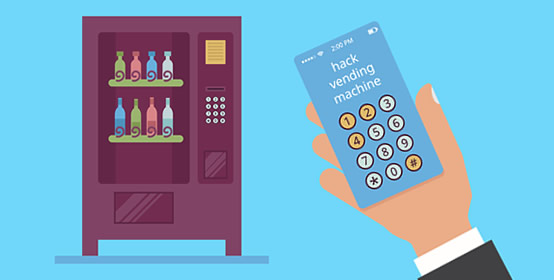
Vending machines are a prime target for hacking attempts. They're generally unattended for significant amounts of time, so it isn't particularly difficult for a hacker to find a window to get free snacks, or even money. Unlike the earliest attempts to hack vending machines—usually using a coin and a piece of tape, or even a blank metal slug—both hackers and vending machines have made things a little more sophisticated.
For some hackers, it might be a matter of convenience. Who wouldn't want free food and drinks? Others might view the machines as a challenge. Modern vending machines are constructed to be resistant to brute-force physical hacks (like rocking a machine back and forth to shake the goods loose), and even incorporate artificial intelligence. Still other hackers may be after something more sinister than a couple of free sodas—like the card numbers and PINs of everyone who uses the machine.
Methods vary depending on what the hackers are after. In one notable example, a handful of CIA contractors managed to circumvent this by disconnecting a network cable during the transaction, preventing the machine from confirming that the payment cards they used actually had any funds. This gave the hackers the ability to obtain pretty much unlimited free snacks, while the vending machine was left unable to tell that no money had been exchanged.
In other cases, machines may vulnerable to firmware mods originating from chip and pin cards. A hacker could use a programmed card just as they would a normal credit or debit card, install the firmware mod, and then return at a later time to retrieve all of the card numbers and PINs collected by the mod in the interval. It's also possible for hackers to install pass-through devices to alter information sent through ethernet cables connected to the machine, or attach credit card skimmers to the interface.
Several high-profile vending machine hacking incidents underscore the severity of the issue and highlight the potential consequences. In 2017, a group of hackers managed to compromise vending machines across a university campus. They exploited vulnerabilities in the machines' software and gained access to the network, leading to unauthorized access to student information and funds. This incident not only resulted in financial losses but also exposed sensitive student data to potential misuse.
For people at all familiar with the kind of questionable advice given in things like “The Anarchist's Cookbook,” it probably isn't at all surprising to find that most of the hacking instructions readily available on the web are either completely bogus, outdated, or the end product of a game of internet telephone. There are plenty of YouTube videos and blog posts detailing ways to hack vending machines for free products, but the majority of these fall squarely in the realm of clickbait—the creators are less interested in actually hacking machines than they are in getting views. Nonetheless, it still behooves manufacturers to secure their machines and data. A hacker stealing a soda now and then may seem low stakes, but a hacker stealing a week's worth of transaction information is a much bigger problem.
Hacks are pretty specific to vendors and models of machine, and, while no vending machine is absolutely foolproof, there are measures manufacturers can take to protect their property and their users' data. To keep a vending machine safe, look at its physical safety first. Machines should be bolted to the floor to prevent tipping, and a good tipping sensor should not be able to be disabled by a magnet or other external device. Any cables entering the machine should come up through the base, not through the back where they can be easily accessed and manipulated. Tubular pin locks also aren't very secure, and should be avoided whenever possible. To protect data, be extra careful with network-connected machines, and always encrypt anything sent over TCP/IP. Have a reputable security consultant audit software to spot vulnerabilities before they become serious issues. Regular maintenance and monitoring practices are essential for preventing vending machine hacks. Owners and operators should implement routine inspections to identify any physical tampering or unauthorized modifications to the machines. Additionally, maintaining up-to-date firmware and software versions, along with promptly addressing any security patches or updates, can significantly reduce the vulnerability of vending machines to hacking attempts.
It's crucial to understand the legal ramifications of vending machine hacking. Hacking is illegal in most jurisdictions and is considered a cybercrime. Individuals caught attempting to hack vending machines can face serious legal consequences, including criminal charges, fines, and potential imprisonment. Beyond the immediate repercussions, a criminal record resulting from hacking can have lasting effects on employment opportunities and personal reputation.
Collaboration between vending machine manufacturers, cybersecurity experts, and law enforcement agencies is vital in combating vending machine hacking. Manufacturers can benefit from working closely with experts to identify potential vulnerabilities and implement robust security measures. Law enforcement agencies play a crucial role in investigating hacking incidents and prosecuting offenders, reinforcing the message that hacking is a serious offense with severe consequences. By fostering collaboration, stakeholders can create a safer vending machine environment for both operators and users alike.
Hacking a vending machine might seem like the kind of thing a bunch of bored contractors or kids might do, but there is potential for a determined hacker to walk away with thousands of credit card numbers. Making machines more difficult to be physically breached or have their firmware manipulated doesn't just protect owners from product loss, it can protect users' sensitive financial data.